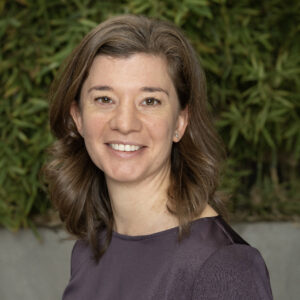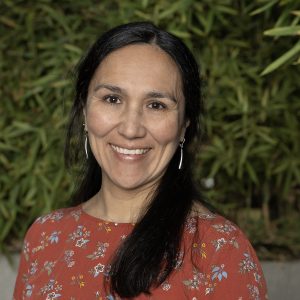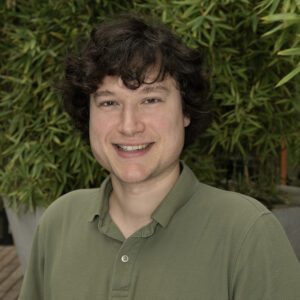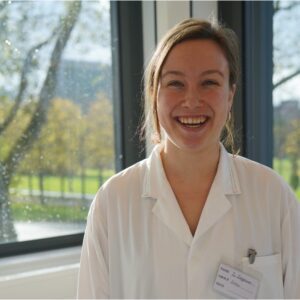
Eveline Snelders
Associate Professor/Lecturer (UHD)
Eveline holds a PhD in Medical Microbiology from the Radboud University Medical Center in Nijmegen (2012) where she also completed the Medical Molecular Microbiology training fellowship (2014). After a Postdoc in Paris at the Institute Pasteur (2015) she joined the chair group of genetics at Wageningen University & Research first as a postdoc on a NWO VENI grant (2016) and later she established her own research group as an assistant professor (2020) and currently as associate professor (2024).

Francisca Reyes Marquez
Research assistant
Francisca holds a PhD in in Cellular and Molecular Biology from the University of Chile, Chile (2008). After being a postdoc at the University of Wisconsin-Madison, USA (2008-2013), she moved back to Chile as an independent investigator at the University of Andres Bello. In 2016 she first joined the group of Horticulture and Product Physiology at WUR and since 2020, she joined the Laboratory of Genetics. Although her background is mostly working in plant cell biology, she has gained considerable experience in fungi too, specifically transformations and CRISPRcas9.

Kira Senden
Technician
Kira obtained her MSc in Molecular Life Sciences at the WUR (2025) where she focused on Genetics and Microbiology. In 2021 she first joined the Laboratory of Genetics as an intern during working on heterokaryon compatibility in fungi. Since then she pursued her interest in mycology including an Msc internship in Astromycology at the German aerospace centre. After her MSc she rejoined the lab working as a technician on the GAF-AFR project.

Hylke Kortenbosch
PhD candidate
Hylke received his MSc degree in Evolutionary Biology at the University of Groningen (2019) where he focused on the ecology and evolution of microbiomes and their hosts. In 2020 he joined the Laboratory of Genetics to start his PhD on the ecology of triazole resistance in Aspergillus fumigatus.

Bo Briggeman
PhD candidate
Bo obtained her MSc degrees in Plant Sciences and Medical Biotechnology at WUR (2023). During her internship at the Westerdijk Fungal Biodiversity Institute (NL), she decided to pursue a career in Mycology. In May 2023, she joined the Dutch National Institute of Public Health and Environment (RIVM) and the Lab. of Genetics (WUR) and started her PhD. Her project focusses on establishing the relationship between azole resistant A. fumigatus in the environment and patients. Bo’s research is funded by the Dutch Ministry of Infrastructure and Water Management (I&W).

Spyros Kanellopoulos
PhD candidate
Spyros obtained his MSc in Molecular and Cellular Life Sciences at Utrecht University, The Netherlands (2023) where he focused on the molecular biology of various fungi. In November 2023 he joined the Laboratory of Genetics to start his PhD on a NWO-M1 funded project. His project focuses on the evolution and genetics underlying the multi-fungicide-resistance in the airborne human fungal pathogen Aspergillus fumigatus.

Dian Zheng
PhD candidate
Dian obtained his MSc in Phytopathology from Northwest A&F University in Xianyang, China. In October 2022, he began his PhD at the Laboratory of Phytopathology at Wageningen University & Research (WUR) with a scholarship from the Chinese Scholarship Council (CSC), under the supervision of Jan van Kan. In July 2024, Eveline Snelders became his co-supervisor, and Dian joined the fungal genetics group at the Laboratory of Genetics. His research focuses on genetic engineering, lifestyle switches, and meiotic drive in Botrytis cinerea.
Alumni

Greg Korfanty 2024 – 2025
Postdoctoral researcher
Martin Weichert 2023 – 2025
Postdoctoral researcher
Ben Auxier 2020 – 2023
PhD graduate and currently an Assistant Professor in the laboratory of Genetics, and co-supervisor of Spyros Kanellopoulos.
News & Media
- December 2025; The schimmelradar project is published in the ISME journal, and Wageningen University & Research wrote a nice press release about the results of this work.
- February 2025; Eveline Snelders was featured on the Dutch science television program NTR Focus, where she discussed the emergence and spread of antifungal resistance. She highlighted why this growing issue is a critical focus for scientific research.
- November 2024; Sijmen Schoustra, Bo Briggeman and Eveline Snelders, featured in an ARD Wissen German television documentary discussing invasive fungi and their impact on health and the environment.
- June 2024; the Health Council of the Netherlands published a new advice on “Resistance undermines the treatment of fungal infections.” Eveline joined the Health Council as a temporary member and expert during the writing of this advice. The report can be found here and is in Dutch. Also covered in Dutch newspapers: NRC, Volkskrant and nu.nl.
- November 2023; The JPI AMR Distomos grant submission has succesfully been awarded to the GAP-AFR consortium led by Eveline as coordinator. More information can be found here. Partners of this consortium are; Michael Bromley, University of Manchester, United Kingdom (Partner), Jorge Amich, Instituto de Salud Carlos III, Spain (Partner), Alida Fe Talento, Trinity College Dublin, Ireland (Partner), Felix Bongomin, Gulu University, Uganda (Partner), Laurence Millon, University Hospital of Besançon, France (Partner), Matthew Fisher, Imperial College London, United Kingdom (Observer).
- September 2023; a Dutch citizen science project was launched in autumn of 2023 to determine the azole resistance background levels in air.
In Dutch:”Het voornaamste doel van Schimmelradar is om uit te vinden hoeveel sporen er in de lucht aanwezig zijn in Nederland en welk deel van deze sporen azool-resistent zijn. Daarom roepen we in het najaar van 2023 mensen op om samen met ons door heel Nederland te meten. Eveline Snelders was te zien in RTL Nieuws en te horen op Radio 1 over Schimmelradar. Ook kunt u ons persbericht teruglezen in het AD of bij Vroege Vogels.
Teaching
We are involved in the following courses @WUR:
ENT-51306 – Frontiers in Medical and Veterinary Biology
GEN-30306 – Genetic Analysis, Trends and Concepts (GATC) Coordinator
Students are welcome to join (MLO, HLO, BSc or MSc), if you are interested in doing your internship or thesis just send an e-mail indicating your preferences and interests. For WUR students an up-to-date list of thesis topics from the whole laboratory of Genetics including ours can be found on Brightspace or directly via this link: https://bit.ly/3DCJbBU
Research
A. fumigatus is ubiquitously found in nature facilitated by wind-borne dispersal of spores and its main habitat is decaying plant material. It can also cause severe invasive infections in the lungs of immunocompromised patients. Luckily there are highly effective antifungal drugs available and the azoles are the most important class to manage Aspergillus disease. Unfortunately a global emergence of azole resistance poses a major threat to manage fungal disease. Our research has shown that the use of agricultural azoles has facilitated emergence of azole resistance, a typical One Health problem. For our research we study the fungus where environment and human health interact by using genetic approaches such as sexual crosses, evolutionary lines, competition experiments, whole genome sequencing, bioinformatics and more.
We are involved in the NWO GreenIII project entitled “One health consequences of circularity; what lessons to learn from the saprophytic and human pathogenic fungus Aspergillus fumigatus?” The objectives of this project are to (i) use the diversity of organic waste disposal in the bulb-sector to discern the key factors driving resistance development, (ii) use these factors to draw up an intervention plan that will be tested in the laboratory and on-site, and (iii) extend the obtained knowledge to general organic waste disposal to assess resistance and health risk across the system. Hylke Kortenbosch is appointed as the PhD student on this project.
With the NWO Aspasia funding we have now set up CRISPRcas9 in our laboratory (BSLII), by receiving technical support from Dr. Francisca Reyes Marquez. By receiving an NWO ENW-M1 funding in 2023, that is intended for conducting curiosity-driven fundamental scientific research with an impact, we will focus more broadly on which genes in the fungus cause multi fungicide resistance (not just azole resistance) and what the long-term consequences are for the treatment of fungal infections in hospitals and for crop protection in agriculture. This funding also allows us to implement the Galleria Mellonella virulence model. In November 2023, we received a JPI-AMR Distomos grant for the project GAF-AFR. Here, together with six international partners, we will develop tools to detect the emergence of dual-use antifungal resistance and provide appropriate risk assessments strategies. In addition, we aim to bridge the gap between environment and patient by using air sampling surveillance to investigate the exposure risk of antifungal resistant A. fumigatus in a wide range of geographical areas (including EU and Africa). The project has kicked-off June 1st 2024.
Recent publications
Our scripts, codes and other supporting data can be found on GitHub.
An extensive list of all publications can be found on Google Scholar.
Land use drives drug resistance in an airborne human fungal pathogen. Hylke H. Kortenbosch, Bo Briggeman, Francisca Reyes Marquez, Ben Auxier, Sytze de Bruin, Bas J Zwaan, Eveline Snelders.
The ISME Journal 2025
https://doi.org/10.1093/ismejo/wraf246
Widely dispersed clincal expansion of multi-fungicide-resistant Aspergillus fumigatus limits genomic epidemiology prospects.
Eveline Snelders, Brandi N Celia-Sanchez, Ymke C Nederlof, Jianhua Zhang, Hylke H Kortenbosch, Bas J Zwaan, Marlou Tehupeiory-Kooreman, Alejandra Giraldo-López, Karin van Dijk, Li Wang, Marin T Brewer, Michelle Momany, Ben Auxier, Paul E Verweij
mBio 2025
doi:10.1128/mbio.03652-24
High-Throughput culture and DNA isolation methods for Aspergillus fumigatus.
Francisca Reyes Marquez, Bo Briggeman, Ben Auxier, Eveline Snelders.
Current Protocols 2025
doi:10.1002/cpz1.70112
The Narrow Footprint of Ancient Balancing Selection Revealed by Heterokaryon Incompatibility Genes in Aspergillus fumigatus.
Ben Auxier, Jianhua Zhang, Francisca Reyes-Marquez, Kira Senden, Joost van den Heuvel, Duur K. Aanen, Eveline Snelders, Alfons J.M. Debets.
Mol Biol Evol. 2024
doi:10.1093/molbev/msae079
The human fungal pathogen Aspergillus fumigatus can produce the highest known number of meiotic crossovers.
Ben Auxier, Alfons J.M. Debets, Felicia Stanford, Johanna Rhodes, Frank M. Becker, Francisca Reyes Marquez, Reindert Nijland, Paul S. Dyer, Matthew C. Fisher, Joost van den Heuvel, Eveline Snelders.
PLoS Biology 2023
https://doi.org10.1183/23120541.00020-2020
Grants
Past funding:
2011 ESCMID Research grant
2015 NWO VENI
2018 ZonMW Off Road
2019 ESCMID Research grant
Current funding:
2019 NWO GreenIII
2020 NWO Aspasia
2023 NWO ENW M1
2024 JPI-AMR Distomos

Sporulating colony

Asexual conidiospore

Sexual crossing plate with cleistothecia’s

Sexual ascospore